KARACHI: Authorities in one Pakistan province are turning to a controversial new tactic in the decades-long initiative to wipe out polio: prison.
Last month, the government in Sindh introduced a bill that would imprison parents for up to one month if they fail to get their children immunized against polio or eight other common diseases.
Experts at the World Health Organization and elsewhere worry the unusual strategy could further undermine trust in the polio vaccines, particularly in a country where many believe false conspiracies about them and where dozens of vaccinators have been shot and killed.
Adding to the problems faced by experts trying to persuade people of the vaccines’ safety: The oral vaccines themselves now cause most polio cases worldwide.
WHO’s polio director in the Eastern Mediterranean warned the new law could backfire.
“Coercion is counterproductive,” said Dr. Hamid Jafari.
He said health workers have typically succeeded in raising immunization rates in vaccine-hesitant areas by figuring out the reasons for people’s refusal and addressing those concerns, like bringing in a trusted political or religious leader to talk with people.
“My own sense is that Pakistan wants to have this legislation in their back pocket in case they need it,” Jafari said. “I would be surprised if there’s a willingness to actually enforce these coercive measures.”
Pakistan and neighboring Afghanistan are the only countries where the spread of polio has never been stopped. The potentially fatal, paralyzing disease mostly strikes children up to age 5 and typically spreads in contaminated water.
WHO and its partners have administered billions of vaccine doses since they first began trying to eradicate the disease in 1988. The effort costs nearly $1 billion a year and is largely funded by donor countries and private organizations including the Bill & Melinda Gates Foundation.
The immunizations, given to children as drops in the mouth, have reduced polio cases by more than 99 percent. But in very rare cases, the live virus in the vaccine can cause polio or mutate into a strain that triggers a new outbreak.
So far this year, there have been seven cases of polio caused by the wild virus — all in Pakistan and Afghanistan. Meanwhile, more than 270 cases have been caused by a virus linked to the vaccine in 21 countries across three continents.
In January, roughly 62,000 parents, mostly in Pakistan’s Sindh province, refused polio vaccinations for their children, prompting authorities there to propose the new law with penalties.
The bill is in the final stages of becoming law after the provincial assembly approved it in August. It would punish parents with up to a month in prison for failing to vaccinate their children against certain diseases; they could also be fined up to 50,000 rupees ($168). Officials said their primary aim was to boost polio immunization rates, though diseases including measles, pneumonia and pertussis are also in the legislation.
Rukhsana Bibi, a health worker in Karachi, hopes the new law will reduce vaccine refusal rates and protect health workers. Karachi is considered at high risk for a polio resurgence.
Bibi noted that in the past, abusive or threatening parents have been detained by police. They were released on the condition that they have their children immunized, and that they help the polio team with outreach efforts.
There are multiple factors fueling vaccine hesitation in Pakistan.
Many people are suspicious of the outside entities funding the vaccines and of the Pakistan government itself.
Some “fringe elements” believe in a false conspiracy theory — that the vaccines are part of a plot by Western outsiders to sterilize people, Bibi acknowledged. But many parents would prefer that the government provide better health care, food or financial assistance.
“Parents believe that’s because the government gets grants and donations for such vaccines, so it keeps focusing on (the polio vaccines) instead of providing basic health care,” Bibi said. “It makes parents suspicious.”
The public’s already-shaken confidence in vaccine drives also took a dive in 2011, when the US Central Intelligence Agency set up a fake hepatitis vaccination program in an attempt to gather intel on former Al-Qaeda chief Osama bin Laden. Militants have also gunned down health workers distributing vaccines and sent suicide bombers to blow up the police vehicles protecting them.
Heidi Larson, director of the Vaccine Confidence Project at the London School of Hygiene and Tropical Medicine, said it was disheartening that people were so mistrustful of the government that they didn’t believe the polio vaccine was in their children’s best interests.
“I don’t think in this kind of situation that throwing parents in jail is going to help,” she said. “Not only does it not work, but it’s likely to ramp up the anger.”
Larson drew a comparison to COVID-19 vaccine mandates implemented in countries including Australia, Britain, France and the US.
“It’s a challenge because when you’re talking about a (vaccine) that comes with a risk, even if it’s a very small one, can you force this and make people take it?” Larson asked.
In some parts of Sindh province, the refusal rate for the polio vaccine is as high as 15 percent, according to a government official who was not authorized to comment publicly and spoke to The Associated Press on condition of anonymity. To eradicate polio, more than 95 percent of the population needs to be immunized.
The Sindh official said parents would be penalized for refusing the vaccine, but doses wouldn’t be administered to their children without their consent.
Dr. Paul Offit, director of the Vaccine Education Center at the Children’s Hospital of Philadelphia, said it would be extremely challenging to rebuild trust with punitive measures.
“The oral polio vaccine is not the best vaccine, but it’s still much better than not getting the vaccine at all,” Offit said. “It’s ultimately the job of governments to stand up for children and we know that if we don’t vaccinate a certain percentage of children, that polio will always come back.” Last year, the virus was detected in rich countries including Britain, Israel and the US for the first time in nearly a decade.
Muhammad Akhtar, the father of three children in Karachi, said he believes in the importance of polio vaccination because his cousin was sickened by the disease. But Akhtar disagrees with the idea of punishing people, saying parents should be able to choose which vaccines their children receive.
Another father, Khan Muhammad, of Benaras Town near Karachi, is among those who believe in the false conspiracy theories. He has seven children and argues that polio is just like any other debilitating disease.
“Allah blessed us with these children and he alone will protect them,” Muhammad said. “At the end of the day, it’s God’s will.”
Pakistan officials consider a new way to boost polio vaccination — prison
https://arab.news/ck764
Pakistan officials consider a new way to boost polio vaccination — prison
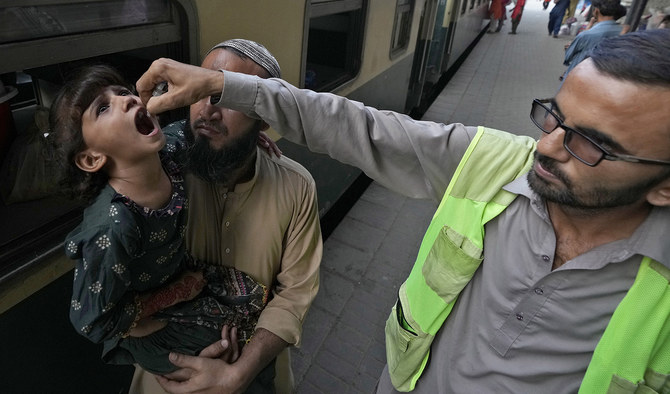
- Sindh introduced a bill last month that would imprison parents for up to one month if they refused immunization
- Experts at the World Health Organization worry the unusual strategy could further undermine trust in polio vaccines
Pakistan appoint Kirsten, Gillespie head coaches for white-ball, Test formats
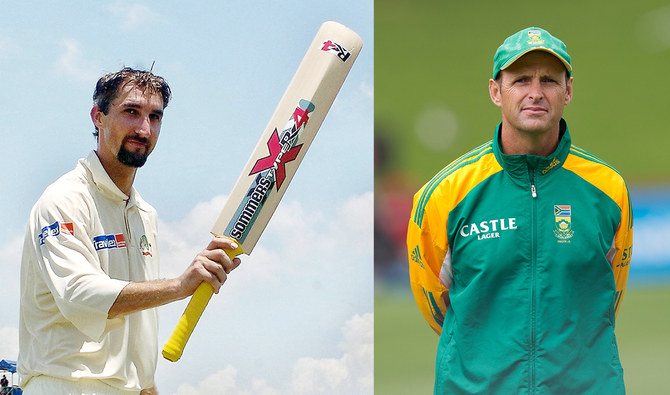
- Former South African batter Gary Kirsten coached Inda to World Cup glory in 2011, number 1 spot in Test format
- Former all-rounder Azhar Mahmood confirmed as Pakistan’s assistant coach in all three formats of the game
ISLAMABAD: The Pakistan Cricket Board (PCB) on Sunday announced it had roped in Gary Kirsten as the national squad’s new head coach for limited-overs cricket and Jason Gillespie for the Test format, with less than two months to go before the ICC T20 World Cup 2024 kicks off in the West Indies and USA.
Pakistan were without head coaches for both formats of the game after former team director Mickey Arthur and coaches Grant Bradburn and Andrew Puttick were transferred to the National Cricket Academy (NCA) in Lahore after a change in their portfolios in November 2023.
The trio left their respective positions in January this year, months after Pakistan’s abysmal performance in last year’s 50-over World Cup in India.
“The three appointments have been made for a two-year period following a recruitment process,” the PCB said in a statement, adding that former cricketer Azhar Mahmood has been confirmed as assistant coach in all three formats of the game.
“I extend my congratulations to Jason Gillespie and Gary Kirsten on their appointments as the red and white-ball head coaches of the Pakistan men’s cricket team, respectively,” PCB Chairman Mohsin Naqvi said at a news conference on Sunday.
“Their stellar track records precede them, and I warmly welcome them to the Pakistan cricket family.”
Kirsten, 56, is a former South African top-order batter who played 101 Test matches and 185 ODIs from 1993-2004 in which he scored a total of 14,087 runs and 34 centuries.
The 56-year-old former South Africa top-order batter played 101 Tests and 185 ODIs from 1993-2004 in which he accumulated a total of 14,087 runs with 34 centuries.
Kirsten coached India from 2008-2011 and helped them win the ICC Men’s Cricket World Cup 2011 title and attain the number one position on the ICC Test Team Rankings.
He also coached South Africa men’s cricket team from 2011-2013 and inspired them to the number one position on the ICC Test Team Rankings.
Kirsten has coached Indian Premier League (IPL) teams Delhi Capitals and Royal Challengers Bengaluru, and is presently the batting coach and mentor of Gujarat Titans, who won the 2022 IPL tournament.
“It’s a tremendous honor to be entrusted with the responsibility of coaching the Pakistan men’s national team in white-ball cricket and to rejoin the international cricket arena after some time,” Kirsten told PCB Digital.
“I eagerly anticipate this opportunity and aim to contribute positively to the Pakistan men’s national team in limited-overs cricket.”
Kirsten will take charge of the side immediately after completing his assignment in the IPL. During his tenure, besides the upcoming ICC Men’s T20 World Cup 2024 and other bilateral white-ball series, Kirsten will also be in charge of the side for next year’s ICC Champions Trophy 2025 in Pakistan, ACC T20 Asia Cup 2025 and the ICC Men’s T20 World Cup 2026 in India and Sri Lanka.
Meanwhile, former Australia fast bowler Gillespie will assume responsibilities for Pakistan’s ICC World Test Championship fixtures against Bangladesh (at home in August), which will be followed by Tests against England (at home in October) and South Africa (away in December) in the 2024-25 season.
“I am grateful to the PCB for their faith in my abilities and giving me the honor of coaching one of the most highly-regarded and talented cricket teams in the traditional format of the sport,” Gillespie told PCB Digital.
“Leading the Pakistan cricket team is a big achievement for any coach, given its rich legacy and passionate fan base.”
Gillespie said he wanted to win Tests for Pakistan, which is why he had taken up the coaching assignment.
“Within Pakistan we have a number of high-quality fast bowlers and being able to utilize them will be a key part of any success we enjoy,” Gillespie said.
“But we have quality in all departments – pace, spin, batting and keeping. We have all bases covered. It is exciting to know we have that talent and I am looking forward to working with such talented players.”
Gillespie, 49, has played 71 Tests, 97 ODIs and 1 T20I from 1996-2006. He has taken a total of 402 wickets and accumulated 1,531 runs. The former pacer was part of the Australia squad that won the ICC Men’s Cricket World Cup 2003 in South Africa.
Gillespie has coached Yorkshire County Cricket Club to back-to-back County Championship titles in 2014 and 2015 and is credited with developing England stars Jonny Bairstow, Gary Ballance and Joe Root during his time with Yorkshire.
KP CM directs authorities to remain alert as rains kill 5, injure 8 in two days
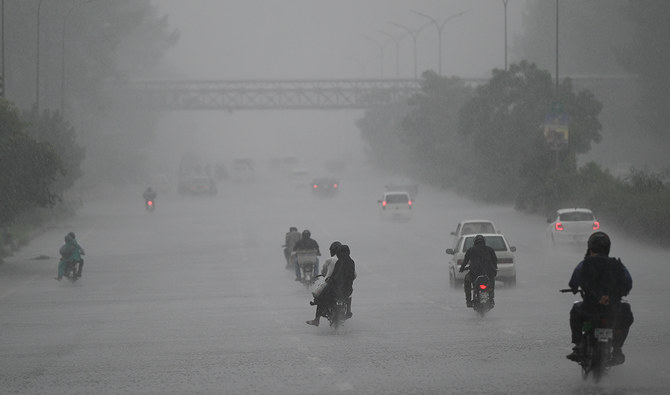
- Heavy rains in northwestern Pakistan since Apr. 12 have killed at least 65, injured over 80
- KP chief minister asks authorities to submit detailed report on losses suffered due to heavy rains
PESHAWAR: The chief minister of Pakistan’s Khyber Pakhtunkhwa (KP) on Sunday directed authorities to remain alert after heavy rains in the northwestern province killed five and injured eight in the last two days.
At least 65 people have been killed and over 80 injured in KP from rain-related incidents since Apr. 12. Three men and two women were killed in the last two days from rain-related incidents while five children, two men and one woman were reported to be injured, the latest report from the Provincial Disaster Management Authority (PDMA) said.
“Fourteen houses in total were damaged due to lightning strikes and from the walls or roofs of the house collapsing,” the report said. “One house was completely destroyed while 13 were damaged.”
The deaths were reported in KP’s Bajaur, Battagram, Mansehra, Buner, Dir Upper and Lower districts, the PDMA said.
“KP CM Ali Amin Gandapur has directed district administrations and other concerned departments to remain alert in view of the upcoming rain spell in the province,” the state-run Radio Pakistan said.
Gandapur asked authorities to submit a detailed report on the losses suffered due to heavy rains in the province.
“The provincial government is with the affected people during this hour of grief,” Gandapur said, according to a statement from his office. “Those affected will not be left alone and they will be offered every help.”
Separately, the PDMA has issued an alert about rains and snowfall in different parts of the province, adding that the current spell of rain will continue in the city till Tuesday.
“The PDMA has advised all the relevant departments to stay alert for restoring road links for traffic in case of closure due to landslides,” Radio Pakistan reported.
“The control room of PDMA is operational round the clock and people can contact by dialing 1700 in case of any emergency.”
A Hindu festival in southwestern Pakistan brings a mountainous region to life
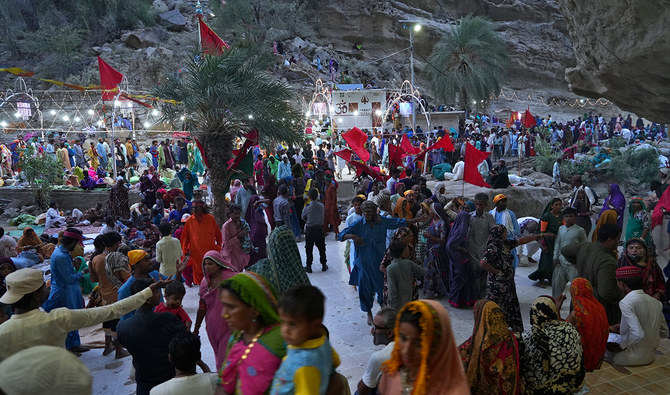
- Pakistan’s largest Hindu festival, Hinglaj Yatra, began on Friday and ends on Sunday
- Organizers says more than 100,000 are expected to participate in the festival
HINGLAJ, Pakistan: The ascent of steep mud volcanoes marks the start of Hindu pilgrims’ religious rituals in southwestern Pakistan.
They climb hundreds of stairs or clamber over rocks to reach the summit, tossing coconuts and rose petals into the shallow crater while seeking divine permission to visit Hinglaj Mata, an ancient cave temple that is the focus of their three-day worship.
The dramatic surroundings of Hingol National Park in Baluchistan province are the setting for Pakistan’s largest Hindu festival, Hinglaj Yatra, which started on Friday and ends on Sunday. Organizers say more than 100,000 Hindus are expected to participate.
Muslim-majority Pakistan is home to 4.4 million Hindus, just 2.14 percent of the population, and Hinglaj Mata is one of the few Hindu sites that continues to draw large numbers of pilgrims every year from across the country.
Muslims and Hindus generally live peacefully in Pakistan, from where most of the Hindus migrated to India when it was divided by British colonialists in 1947. But there have been attacks on Hindu temples in recent years as relations between the rivals remain tense.

Hindus believe Hinglaj Mata is one the places where the remains of Sati, the goddess of marital felicity and longevity, fell to earth after she ended her life.
Maharaj Gopal, the temple’s most senior cleric, explains why people flock to it.
“It is the most sacred pilgrimage in the Hindu religion,” said Gopal. “Whoever visits the temple and worships accordingly during these three days will have all of their sins forgiven.”
The journeys begin hundreds of kilometers (miles) away, mostly from neighboring Sindh province. Hundreds of packed buses set off from cities like Hyderabad and Karachi, traveling along the Makran Coastal Highway that hugs Pakistan’s south and southwest.

But there’s scant parking and vehicular access to the holy sites, so many pilgrims disembark and complete their travel by walking over parched and rocky terrain, sometimes barefoot and carrying children or luggage.
It’s a few kilometers (miles) from the main road to the mud volcano and then, from there, almost 45 kilometers (25 miles) to Hinglaj Mata.
Winds buffet the desert-like conditions, churning up dust that whips the eyes, nose and mouth. The pilgrims’ festive cheer and brightly colored apparel are a contrast to the arid landscape. Strong gusts distort people’s celebratory cries of “Jai mata di” and “Jai shiv shankar.”
Kanwal Kumar, 28, was visiting the temple for the first time with her husband. “We have yet to conceive a child after six years of marriage, so we are hopeful for help from the goddess,” she said. “We believe that no one returns empty-handed. All wishes are granted by Hinglaj Mata.”
The Hindu festival brings the Pakistani park to life. Hundreds of stalls spring up to sell snacks, drinks, jewelry, and clothing. Vats of hot food are prepared in the open air or thatched huts. Pilgrims purchase coconuts, sweetmeats, flowers, and incense for their ritualistic offerings.
Aloo Kumar, 55, wanted to express her gratitude to Lord Shiva, one of Hinduism’s three most important deities. “He blessed our family with a grandson,” Kumar said, gesturing toward the boy beside her cradling his baby sibling. “We prayed for a grandson during last year’s festival.”

Hinglaj Mata thrums with activity, even after dark. Fairy lights and other decorations adorn the shrine and pilgrims jostle for position in front of it, sometimes holding up babies so the deities can bless them. Stewards urge them to pay their respects and move along.
The park’s Hingol River provides Hindu pilgrims with the opportunity for ritual bathing, like the Ganges in India.
While there is no ban on Hindu worship in Pakistan, openly practicing the faith is not routine as ties between India and Pakistan are broken. Their interactions are riddled with animosity and suspicion after having fought three wars, built up their armies and armed them with nuclear weapons.
Travel restrictions and hostile bureaucracies largely keep people from crossing the border for leisure, study and work, although the countries sometimes make exceptions for religious pilgrimages, usually for India’s Sikhs.
The decades of political hostility present a challenge for the minority Hindu community, as many in Pakistan equate Hindus with India. The reverse exists in India, where Muslims complain of discrimination.
Versimal Divani, the general secretary of Hinglaj Mata, lamented that only Hindus in Pakistan can attend the festival.
“We can visit this temple in our beloved country whenever our heart desires,” said Divani. “But this is not the case for the rest of the world’s Hindus. I would like the Pakistani government to issue them visas so they can come here and take blessings with them. It’s good for people-to-people contact and it’s good for the economy too.”
Pakistan considers Chinese nationals’ security its ‘core responsibility,’ says interior minister
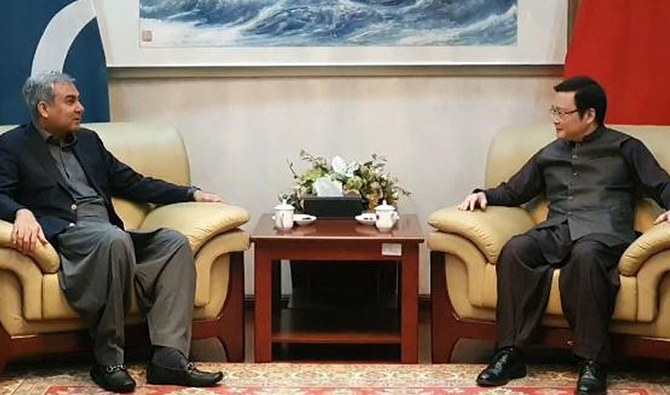
- Pakistan’s Interior Minister Mohsin Naqvi meets Chinese Consul General Zhao Shiren in Islamabad
- A suicide attack in northwestern Pakistan last month killed five Chinese engineers and a Pakistani
ISLAMABAD: Interior Minister Mohsin Naqvi this week assured China’s consul general that the security of Chinese nationals in the South Asian country is Pakistan’s “core responsibility,” state-run Associated Press of Pakistan (APP) said, as Islamabad looks to bolster security of foreign nationals amid a surge in attacks.
Pakistan says it has taken steps to enhance Chinese nationals’ security in the country after a suicide bomber last month attacked a convoy of Chinese engineers working on a hydropower project in the northwestern town of Dasu. Five Chinese engineers and their Pakistani driver were killed in the attack.
The attack was the third major one in a little over a week on China’s interests in the South Asian nation, where Beijing has invested over $65 billion in energy, infrastructure and other projects as part of its wider Belt and Road initiative.
“Chinese nationals’ safety is our core responsibility, instructions have been issued to the concerned agencies to ensure the safety of Chinese citizens,” Naqvi told Chinese Consul General Zhao Shiren during a meeting in Islamabad on Saturday.
“The minister informed about the measures taken about the security of Chinese citizens, adding that it is our national responsibility.”
The minister assured Shiren that Pakistani authorities would not allow conspiracies to harm Pakistan’s friendship with China.
Meanwhile, the Chinese envoy said the two countries were all-weather friends.
Chinese interests in Pakistan’s southwestern Balochistan province have also been under attack primarily by the militants, who seek to push Beijing out of the mineral-rich territory.
Pakistan is home to an insurgency launched by ethnic Baloch separatists who seek secession from the central government in the country, blaming it for the inequitable division of natural resources in the southwestern Balochistan province. The government denies this.
Pakistan to conduct week-long polio vaccination drive in Sindh, KP from Apr. 29
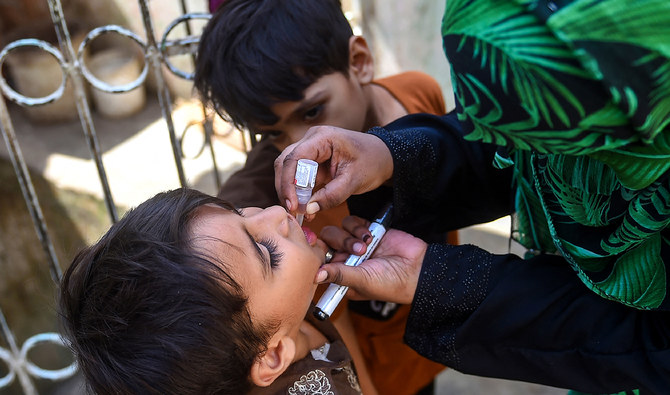
- Campaign to begin in 25 districts of Sindh, 13 districts of Khyber Pakhtunkhwa, says state media
- Eight million children in Sindh, 2.8 million in Khyber Pakhtunkhwa to be vaccinated during campaign
ISLAMABAD: The Pakistani government will conduct a week-long polio immunization program in the country’s northwestern Khyber Pakhtunkhwa and southern Sindh provinces from Apr. 29, the state-run Radio Pakistan reported on Sunday.
Pakistan and Afghanistan are the only two countries in the world where the poliovirus, which causes paralysis and can be a life-threatening disease, is endemic.
“A week-long National Immunization Campaign will begin in twenty-five districts of Sindh and thirteen districts of Khyber Pakhtunkhwa from tomorrow,” Radio Pakistan said in a report.
Chief Minister Sindh Syed Murad Ali Shah chaired a meeting of the Provincial Task Force for Eradication of Polio in Karachi on Saturday. Shah directed all district administrations to cooperate with the polio teams and make the drive successful, the report said.
“The meeting was informed that around eight million children up to the age of five years would be administered anti-polio vaccines during the campaign,” the report said.
Meanwhile, over 2.8 million children will be administered anti-polio drops during the drive, the Khyber Pakhtunkhwa Emergency Operation Center said.
“Twenty-one thousand teams have been constituted for this purpose,” the report added.
Pakistan’s efforts to contain polio have often been met with opposition, especially in the country’s northwestern KP province, where militants have carried out attacks against vaccinators and the security teams guarding them.
Many believe in the conspiracy theory that polio vaccines are part of a plot by Western outsiders to sterilize Pakistan’s population.
Pakistani masses’ doubts regarding polio campaigns were exacerbated in 2011 when the US Central Intelligence Agency set up a fake hepatitis vaccination program to gather intelligence on former Al-Qaeda chief Osama bin Laden.










